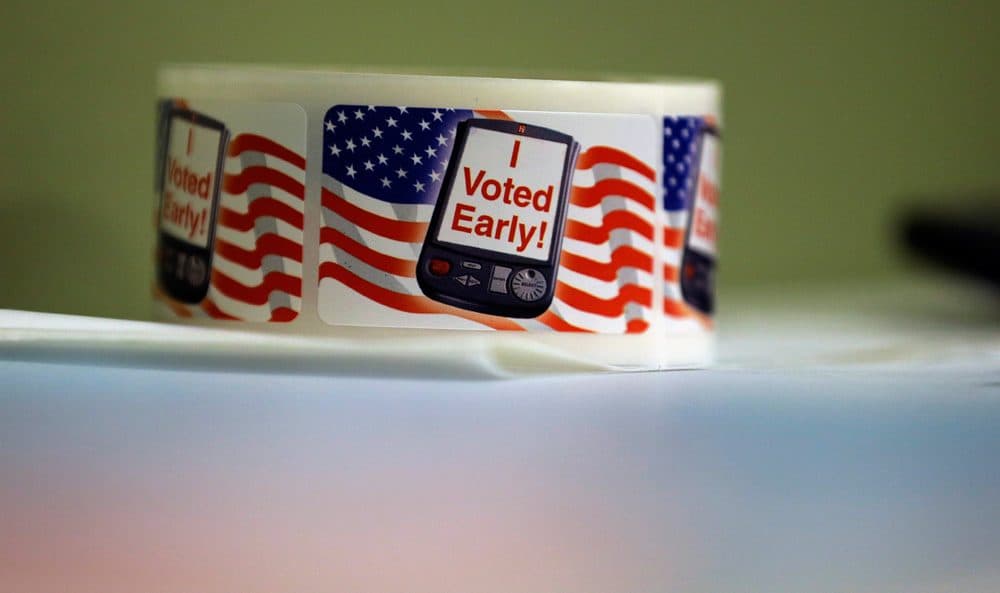Advertisement
Research Suggests Mass. Election Reform Could Be On Wrong Track
Resume
First in a new, occasional segment called "Policy Shop," in which WBUR political reporter David Scharfenberg looks at the biggest public policy questions in New England — and the sometimes-surprising things social science research tells us about those questions.
Here, with host Deborah Becker, Scharfenberg analyzes the implications of an early voting bill the that is on the verge of being approved by the Massachusetts Legislature.
David Scharfenberg: After years of debate, the Legislature is on the verge of approving a big election reform package. If the bill passes, you'll finally be able to register to vote online — believe it or not, it's all on paper right now. And you'll also be able to vote up to 10 days before an election. It's called early voting and it's already in place in 32 states and Washington, D.C.

Deborah Becker: That sounds like a good thing. Is it?
Well, there are some good reasons to put early voting in place. It can make voting more convenient. It can even cut down on costs — you don't need as many poll workers on Election Day if half the electorate has already voted.
But the most compelling argument for early voting — and you hear it here in Massachusetts — is that it will boost turnout and increase participation in our democracy. And you'd think that stretching an election out over 10 days would do just that.
But here's the thing: The research just does not show any significant gains.
I wanted to know why. So I talked to Barry Burden, a political science professor at the University of Wisconsin-Madison who studies election reform. He said the people who take advantage of early voting are people who would vote anyway:
People who are higher income, higher education, more partisan, more informed, more ideological. Really all the things that predict voting in the first place are the same variables that would predict whether a person takes advantage of early voting.
So it's the political junkies who are going to the polls early.
So, early voting does not boost turnout.
Exactly. And Burden's research — it's a little unique in this respect — suggests early voting can actually depress voter turnout by 3.5 to 5.5 percentage points.
His working theory is that a traditional Election Day — with all the media hoopla and people standing out with signs — exerts social pressure to vote.
In contrast, when you have lots of early voting, Election Day is sort of the end of a long process and doesn't have quite the firepower that it once had. And so early voting has the potential to sap the power of Election Day.
I should say here that President Obama's recent success in pushing supporters to cast early ballots in parts of the country has some researchers eager to take another look. But the research so far is pretty clear: Early voting does not boost turnout.
Are there other reforms that would make a difference?
Well, 10 states and Washington, D.C. have something called Election Day registration — or EDR — in place. And it's just what it sounds it like: You can show up on Election Day, register on the spot and vote.
Here's Burden on why it's a more effective reform:
EDR solves a problem for voters. It takes away the requirement that a person has to register in one place at one time, in advance of Election Day, and then show up at a different place at a different time on Election Day to vote.
With Election Day registration, Burden says, people who get interested in the closing days of a campaign — people who are not political junkies — can just show up on Election Day and vote. They're not missing some voter registration deadline that passed a month ago. His research suggests Election Day registration can boost turnout as much as 7 points.
Did Massachusetts lawmakers consider same-day registration?
The state Senate actually included it in their bill, but the House did not. And advocates don't expect it to survive the House-Senate conference committee going on right now.
One possible reason: A last-minute surge in voter interest — new voters jumping into the process — doesn't generally favor incumbents. And it's incumbents who are voting on this legislation.
So, we could end up with a bill that makes voting easier, but does not really do anything to bring new voters into the process, and potentially could make it worse.
That's right. Advocates say we've got election reform with a missing piece.
Now, I should add that even the rosiest research on that missing piece — Election Day registration — suggests a pretty modest bump in voter turnout. And all of the political scientists I talked to said the initial hopes around election reform of any kind have not really been realized.
Here's University of Maryland government and politics professor Michael Hanmer:
My argument is that, you know, simply flipping the switch and changing the electoral rules won't have much effect on turnout because there are motivational factors that are really at the core of what makes somebody want to vote. And those are harder to change.
Political scientists say it's really structural differences that explain the sometimes-breathtaking differences in voter turnout between, say, Minnesota and Texas — we're talking 25 percent higher voter participation in Minnesota than in Texas in the last presidential election.
A state with a wealthy population, and close-fought partisan battles that gin up voter interest, is going to draw more voters to the polls.
Now, we've got wealth in Massachusetts. But we're not much of a battleground; we're a deep blue state. So if Democrats in the state Legislature really want to boost turnout, they'll probably have to hope for a stronger Republican Party.
This segment aired on March 3, 2014.